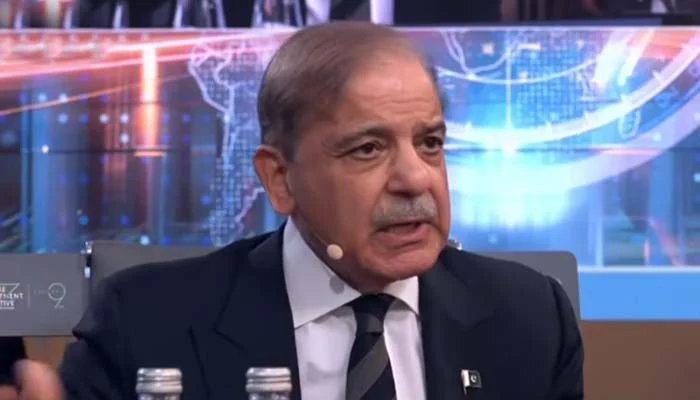
Shehbaz Sharif Climate Speech: Pakistan Suffers $130 Billion Climate Loss Despite Minimal Emissions, Says PM Shehbaz
Climate Vulnerability and Economic Strain
Prime Minister Shehbaz Sharif has revealed that Pakistan has endured economic losses exceeding $130 billion due to climate-induced disasters, despite contributing less than a fraction of one percent to global carbon emissions. Speaking at a panel discussion during the ninth Future Investment Initiative (FII9) conference in Riyadh, the premier underscored Pakistan’s position as one of the most climate-affected nations in the world, “through no fault of its own.”
He highlighted that Pakistan’s negligible emissions had not shielded it from the devastating effects of global warming. “Our emission is less than a fraction of 1%, and yet in 2022 we faced devastating cloudbursts, floods, and storms,” he said.
The 2022 floods, one of the worst in Pakistan’s history, submerged vast swathes of land, displaced millions, and destroyed essential infrastructure and crops. PM Shehbaz lamented that the calamity had forced the country to depend heavily on external borrowing to finance recovery and reconstruction.
“Going Up the Ladder and Coming Back Down”
Reflecting on the recurring nature of climate shocks, the prime minister likened the situation to “going up the ladder and then coming back down,” emphasizing how years of economic progress were repeatedly undone by natural disasters.
He explained that Pakistan’s only short-term option to rebuild flood-hit regions had been to take on additional loans, further aggravating the country’s economic fragility. However, he stressed that borrowing was not a sustainable solution, adding that his government was working to “stand up on our own feet” by focusing on domestic reforms and resilience-building initiatives.
Global Responsibility and Call for Support
PM Shehbaz urged the international community to take greater responsibility and extend meaningful assistance to nations like Pakistan that suffer disproportionately from climate change despite minimal contributions to global emissions.
He reiterated that climate justice demanded equitable financial support, particularly for developing economies that face the double challenge of climate adaptation and debt distress. “The global community must share the burden and come to the rescue of humanity,” he asserted.
The prime minister’s remarks echoed Pakistan’s consistent calls for climate financing, debt relief, and international cooperation in building sustainable infrastructure in vulnerable countries.
Reforms and Domestic Transformation
Acknowledging that Pakistan had made mistakes in the past, PM Shehbaz emphasized that his administration was now implementing “robust and deep-rooted reforms” aimed at improving governance, transparency, and fiscal discipline.
He noted that the Federal Board of Revenue (FBR) had been fully digitalised to improve efficiency and reduce corruption. “We are determined to combat corruption with full might,” he affirmed.
The prime minister also pointed to Pakistan’s youthful population, which accounts for around 60% of the total, describing it as both a challenge and an opportunity. He said that empowering youth through education, skill development, and job creation would be essential to driving sustainable growth and resilience in the face of climate and economic challenges.
A Call for Global Collaboration
PM Shehbaz concluded his address by urging world leaders and international institutions to support developing nations that shoulder the consequences of a crisis they did not cause. He emphasized that shared global efforts were essential to ensuring long-term environmental sustainability and economic stability for all.







